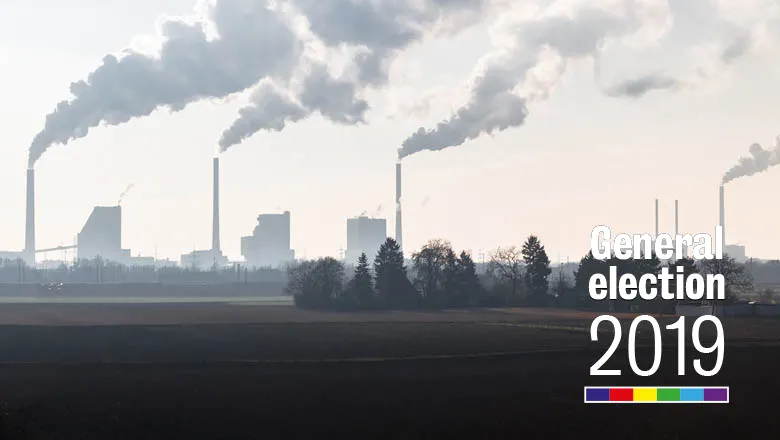But the danger with campaign promises is that voters worried by talk of extinction may produce choices that are impractical and cannot be delivered. This will deepen the sense that democratic politics are broken while doing nothing to alleviate the real risks of a disrupted climate.
Nick Butler
09 December 2019
Vague, sweeping policies risk turning voters against the climate agenda
Nick Butler
NICK BUTLER: There are three serious problems with the policy proposals being offered to voters in response to the challenge of climate change

There are three serious problems with the policy proposals being offered to voters on both sides of the Atlantic in response to the challenge of climate change. The first is that most are uncosted; the second, that many are unrealistic in terms of timescale; and the third, that they do not address the core issue – how to target the major potential sources of future emissions.
The proposed actions put forward during the past few months range from the UK Labour party’s windfall tax on oil companies’ profits in the North Sea designed to collect revenue and discourage new investment in hydrocarbons, to the plans of senator Elizabeth Warren for a complete ban on fracking in the US, to the plan for an acceleration of emissions reduction revealed recently by Ursula von der Leyen, the new president of the European Commission. The British Conservative party also supports nuclear fusion technology, but this is a very long-term project.
Climate change is a central debate at the ongoing international COP25 summit in Madrid. But the danger with campaign promises is that voters worried by talk of extinction may produce choices that are impractical and cannot be delivered. This will deepen the sense that democratic politics are broken while doing nothing to alleviate the real risks of a disrupted climate. For investors, existing businesses could be undermined by ill-judged policies and badly needed new funding will be held back as politicians focus on the wrong agenda.
Few of the policies being promoted are so far backed up by detailed work on how they would be delivered, what they would cost or who would pay. One can argue, of course, that removing the risk of climate change is so important that no cost is too high, but consumers and taxpayers may not look at the issue in this way when the bills start to come in.
The demonstrations by the “gilets jaunes” in France, which began as protests against fuel taxes, and those in Chile triggered by increases in transport fares show that many people see extra levies for the energy they use every day as a personal charge rather than a policy to protect the environment. In the UK, successive governments have blocked increases in fuel duty because of the fears of a backlash from motorists.
If relatively small increases in costs are impossible to implement, how is any democratic government going to push through the much larger ones needed to transform an entire energy system – whether by 2050 or sooner?
Expense does matter, of course, and realistic costing of proposals (measured fairly against the costs of doing nothing and the potential side benefits of undertaking the transition) would help people judge the merits of each. Such a study might well show that simple efficiency measures offer the greatest value for money.
Voters’ decisions on what policies to support are also coloured by the local focus that tends to develop in election campaigns – despite the fact that the key climate challenge is worldwide rather than centred in Britain or the US or any other individual developed economy.
The EU, for example, now accounts for just 10 per cent of global emissions, with the figure falling year by year. The latest forecast from the International Energy Agency, on current policies, shows the bloc’s share of emissions by 2040 as no more than five per cent. Most of the future emissions that will take us beyond the danger level defined by the Intergovernmental Panel on Climate Change will be generated by the emerging economies of Asia.
Since Europe and the US have undoubtedly contributed the bulk of past emissions since the industrial revolution, it is right that the developed world should take a lead in tackling the issue – but that lead should be focused on finding ways of helping emerging economies to limit and reduce their future emissions. Unless can be achieved, whatever is done in Europe or the US will be largely irrelevant.
Policies advocating broad, sweeping changes without adequate detail or consideration of the consequences, especially when they turn out to be expensive and ineffective, risk turning voters against the entire climate agenda. For investors and companies in the energy sector, lack of credibility in proposals is a signal to limit investment and wait for good sense to prevail.
A serious, long-term decarbonisation plan must be applicable to the circumstances of different countries and built on a combination of detailed economic analysis and an understanding of the potential for change from existing technology or that which is within reach through a targeted programme of research and development. The need for such a plan has never been greater.
This piece was originally published in the Financial Times.
Nick Butler is a Visiting Professor at the Policy Institute, King's College London, and the founding Chairman of the Institute. He writes regularly in the Financial Times on Energy and Power.
